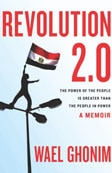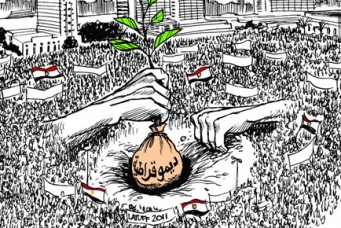Revolution 2.0
Searching for Wael Ghonim
Revolution 2.0: The Power of the People Is Greater Than the People in Power: A Memoir. By Wael Ghonim. Houghton Mifflin Harcourt, 2012, 320 pp.
Egypt’s revolution had no leader. But for a moment during those magic eighteen days of Tahrir, it had a face. Wael Ghonim, the anonymous administrator of the “We are all Khaled Said” Facebook page, the engine that more than any other spurred the protests. Ghonim gave an interview to Mona El-Shazly on Dream TV after eleven days of solitary confinement by state security and openly wept when shown pictures of the hundreds of protestors killed. His irrefutable sincerity, raw and imploring for a better Egypt, turned the tide. The next day the numbers on Tahrir swelled and continued to grow into the mighty consensus that toppled Mubarak.
Wael Ghonim was broadcast across the world. He was lauded as the representative of new Arab generation; young, earnest, humble, English speaking, technologically astute, and who talked of democracy and civil freedoms instead of jihad and down-with-America. He was named in TIME’s 100 most influential people of the year, he was celebrated in a Vanity Fair photo essay of revolutionaries, and he landed a rumored seven-figure book deal. And then he stepped back behind his Twitter feed and sequestered himself from politics.
I spent an afternoon with Wael Ghonim a couple of months after Mubarak’s fall, watching him have his portrait taken by the photographer Platon for another portfolio of revolutionaries, this one commissioned by Human Rights Watch. He was itchy and awkward under the spotlight and much to the consternation of Platon, stood stiffly for the camera, just wanting the whole thing to be over with. He was acutely aware that his new fame had awarded him the privilege of an international platform but he seemed to physically recoil from standing on it himself.
Revolution 2.0 is his account of his role in the Egyptian Revolution. It’s smart, well-paced, and zips along in an easy vernacular. He traces his biography from high school Internet geek to marketing manager at Google in Dubai to his involvement in the Egyptian opposition movements, first as the admin for Mohammed ElBaradei’s Facebook page and then with the establishment of the famously influential “We are all Khaled Said” page. In these pages, we find a man completely at home with the evolving tools of social networking media, who met his American Muslim wife in a chatroom, but who admits to being an introvert. “I find virtual life in cyberspace quite appealing,” he writes of his early attraction to online discussion forums. “I prefer it to being visible in public life.” A large chunk of the book describes how the “We are all Khaled Said” Facebook page grew. He used petitions, opinion polls, and online Q&As as direct source marketing (citing the ‘sales tunnel approach’ he was taught in marketing class) and as feedback to and to link his readers with the ongoing process. And then he watched as the site snowballed in popularity. As he told the American television news program 60 Minutes, in an interview after Mubarak fell, “Our revolution is like Wikipedia. Everyone is contributing content.”
In the run-up to January 25, Ghonim, like others, worried about the inertia of the masses. “The virtual world seemed further from the oppressive reach of the regime and therefore many were encouraged to speak up,” Ghonim writes. “The more difficult task remained, though, which was to transfer the struggle from the virtual work into the real one.” Ghonim himself fought through a police cordon to get to Tahrir on the day and found himself amazed at the numbers who had gathered.
On the evening of January 27, Wael Ghonim was arrested on the street, bundled blindfolded into a car, and taken for interrogation to state security. He was not beaten but his description of the fear of incriminating fellow activists if he gave up his log-on passwords, his bare cell, the rash that spread across his unwashed body, coughing fits aggravated by the damp, and the long, lone hours of waiting incommunicado, makes for a gripping alternative to the mêlée of the revolution convulsing beyond the walls. It is testament to his dogged forthrightness that his interrogators seemed to have arrived at some respect for his position. One told him, “You’re a good kid” even as he patronized him with counter-arguments of foreign provocateurs and the specter of chaos if Mubarak did step down.
Ghonim was released both into a media maelstrom and a labyrinthine backchannel attempt by ruling party chief Hossam Badrawi to orchestrate Mubarak’s step-down. He went from a prison cell to meetings with senior generals and the then prime minister, Ahmed Shafik. Throughout the sleepless, dizzying days that followed, Ghonim kept his moral compass. He never allowed himself to be put forward as a leader of the revolution, and although he articulated the aspirations of many on the square, he never claimed to speak for them. In the confused months that have followed, he has kept a low profile but continues to work for the aspirations of the revolution. He set up a policy think tank, endorsed the presidential candidacy of Abdel Moneim Aboul Fotouh, and lectured IMF officials on its immoral dealings—that prop up dictators. What emerges is a portrait of a shy man with a decent stubborn streak. As he admits, “I have always wanted to swim against the current.”
Wendell Steavenson has been a contributor to the New Yorker since 2006. She is the author of Stories I Stole, which was shortlisted for the Guardian First Book Award, and The Weight of a Mustard Seed: The Intimate Story of an Iraqi General and His Family During Thirty Years of Tyranny. She wrote the screenplay for The Situation, a 2006 film based on her experiences as a reporter in Iraq.






